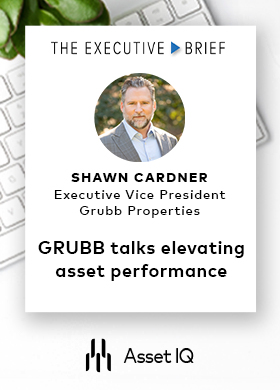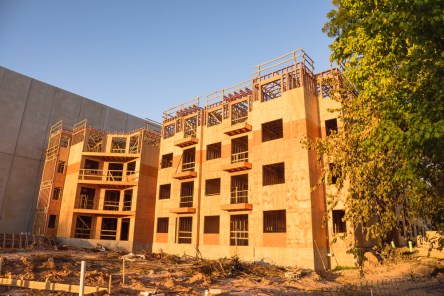At every step of your journey, there are opportunities to elevate your asset performance. Today’s technology can equip you with the tools and insights needed to make the most of every square foot. Read on to learn how you can maximize rents at every stage of your project. Design for density To maximize net rentability, begin with your design. Dense multifamily housing offers more units and the potential to garner more rents. Data from Hanley Wood explores ways to increase density in multifamily, along with the benefits and disadvantages of each methodology. Explore site plans that truly show the relationships between design options and core development metrics. Of the most favorable options, you might: apply for a variance to decrease the setbacks on the site. This relatively simple adjustment can boost your buildable square footage. increase the net rentable square feet (NRSF) by increasing the depth of your units at the desired square footage. In longer runs, you can increase density and the potential for rents. get creative with amenities. When possible, decrease their size and explore options such as an outsourced gym with Amenify or outsourced communal space. With improved density, you help to increase your NRSF and position yourself for greater net rentability. Maximize rents with the latest data If you’re working with a built structure, there are ample opportunities to maximize rents. Implement a program that optimizes the value of your asset using big data, predictive analytics and prescriptive actions. Overall, this approach helps to keep costs low, increase your revenue and mitigate costly operational risks. Consider a solution that allows you to benchmark your operating income and expenses against your competition. Transparency within your portfolio is crucial as well. A robust system synthesizes data throughout your integrated property management, leasing...
Informed Decisions, Better Results
4 Ways Data Management Works for Commercial Real Estate
The most successful companies are those that utilize data and analytics as a supporting tool to adapt to rapid market changes, but how can you simplify Big Data to improve daily decision making? How can online services help you stay connected while safely doing business miles apart? There are innovative solutions that offer a combination of tools that boost profitability, efficiency, communication and even security. Read on to discover four ways asset intelligence (AI) technology can help CRE operators understand how to navigate market shifts and emerge with a competitive edge. 1. Use data to enhance asset performance On average, more North American organizations have been using big data for benchmarking and prescriptive analytics over the past few years. In fact, according to KMPG’s 2020 CEO Outlook, 92% of Canadian CEOs fast-tracked their transformation to meet COVID-19 challenges, with 76% believing that investments in tech tools such as automation, artificial intelligence and cloud systems are critical to unlocking long-term growth. As a result of the tech adoption, the CRE industry is seeing AI enable teams to identify patterns and recognize trends by easily visualizing broader pools of data that influence KPIs, all within a customizable dashboard. With the assistance of automation and machine learning, the data becomes more refined over time facilitating more informed decisions on everything from marketing spend to concessions and leasing velocity. Having ongoing access to distilled real-time reporting encourages team collaboration, a data driven culture and empowers departments to stay on track of projects – it can even give individuals the latitude to go beyond their day-to-day responsibilities. During challenging times, this refined data also gives operators better insight into deals and key early wins that can reassure and even excite stakeholders. 2. Forge a clearer pathway to success with cloud-based data management Cloud-based asset management platforms offer key insights into portfolio health including revenues, debt, risk, occupancy and sales. Such data helps asset managers make more strategic decisions and set stakeholder expectations. Benefits also abound at the property level. Today’s asset management software seamlessly integrates with site-specific tools. Integrated, cloud-based technology supports facility and construction managers, leasing agents and property-level users. From online rent payments to digital procurement, users save time, decrease redundancies and improve accuracy within a single integrated system. With site staff connected to a single point of truth, they can efficiently make better day-to-day decisions. Structured dashboards enhance the value and practicality of data. “[Commercial clients] want a solution that’s designed for them and which connects them to the central data system with mobile applications and dashboards. That’s why we created a connected ecosystem for the operations side with Yardi Elevate,” explains Brian Sutherland, vice president, sales commercial at Yardi. He continues, “Expanding data access to the back office is tied to the larger issue of data management. The challenge is dissecting data and making it actionable for informed decisions. That’s the importance of role-based dashboards that remove guesswork for building operations people who need to control costs and work more efficiently.” Modern asset management technology platforms assimilate data at the property and portfolio levels and make it universally available. With a complete set of information, asset managers can evaluate pipelines, connect investors with appropriate deals and create an effective management plan. More strategic deal execution paves the way to increased revenues and overall success. 3. Gain greater efficiency and convenience throughout your organization with online services The cloud offers a unique opportunity to work with live data from anywhere with an internet connection. Executives can review reports, approve expenses and authorize payments when and where it’s convenient for them. Asset managers virtually present live reports to stakeholders with real-time data that is consistent throughout reporting systems. Whether in the office or a remote work environment, leaders across the organization achieve greater accuracy and efficiency with online services. At the property level, online portals make it easy to process rent payments,...
Asset Performance
Better outcomes with better data
Industry leaders from Grubb Properties and MG Properties Group recently shared insights on big data, benchmarking and forecasting with Yardi’s Paul Yount. “You won’t be successful in any market if you don’t have the right tools. You need the data. You have to be ready and prepared,” said Joe Anfuso, chief financial officer at MG Properties Group. Nothing could have been truer for real estate companies in 2020. With unanticipated challenges brought by the COVID-19 pandemic, real estate operators had to act fast to protect their bottom lines and keep staff and residents safe. For most companies, that meant adopting technology to transform their businesses. Read on to learn how Grubb Properties and MG Properties Group have been using Asset IQ, Yardi’s multifamily asset management software part of the Yardi Elevate suite of multifamily solutions, to guide decisions and improve performance with better data. Pivoting to online services With the growing demand for contactless leasing and transactions, many operators have made the pivot to doing business online. And it’s likely that contactless leasing — including self-guided tours — will be around long after the pandemic. Additionally, asset intelligence driven by big data has been guiding real estate operators through challenging times and will continue to lead the way. “2020 budget numbers were very different from what we projected in 2019. We didn’t see the normal seasonal changes, and budgets were pretty much out the window which has made competitor and peer data very important to accurately measure performance. We need to know how we’re measuring up to our competitors, what concessions and lease terms we’re offering and if we’re keeping the back door closed to avoid being in a vulnerable position,” said Shawn Cardner, executive vice president of Grubb Properties. According to Joe Anfuso,...
Model of Adjustment
QuadReal and Yardi Elevate
While the industrial sector shows strong occupancy and rent performances, office and retail face a host of challenges including deferrals, concessions, spiraling vacancy rates and, of course, the ongoing COVID-19 pandemic. How can commercial real estate companies not just adjust, but thrive in today’s environment? A recent Executive Briefing hosted by Yardi, invited Tom Sheraden, chief technology officer for the QuadReal Property Group, one of Canada’s largest asset managers, to describe how his team used advanced property management software to successfully adapt to the rapidly changing environment. A major advantage for QuadReal was a company culture that embraces not just accepting change but owning it. “Our workforce embodies a deep personal drive to make things work better and to own change, not just accept it,” Sheraden said. A versatile technology platform capable of handling the breadth of QuadReal’s real estate activities also helped make the global real estate investor, operator and developer fully equipped to press ahead with major projects. Through Yardi Elevate, QuadReal can manage the deal pipeline, visualize portfolio health, easily view space availability, analyze risk, complete accurate budgeting and manage construction projects from a single connected solution. “A lot of companies would have taken their foot off the gas. But thanks to our culture of accepting changing technology, we were able to spend our time on forward-looking opportunities versus just surviving,” noted Sheraden, who also paid tribute to staff members whose duties required them to remain onsite throughout the pandemic. Prior to adopting its asset management system, for example, obtaining full operational and financial data typically required a separate business intelligence platform. But Yardi helped QuadReal shift that responsibility to the people with the deepest knowledge of the business. “Our strategy is to empower those analysts with great data, great tools...
Beyond BI
Grubb Dives Deeper
“Grubb has a top-down philosophy of promoting long-term residents,” said Shawn Cardner, executive vice president of operations at Grubb Properties. “We always felt our long-term resident program that caps rent at five years was the right thing to do and was working, but we didn’t have a lot of data on it. We do now thanks to deep property and portfolio analytics, and that’s very exciting.” The analytics Cardner refers to come from Yardi Asset IQ, part of the Yardi Elevate Suite for multifamily. Asset IQ is taking Grubb beyond business intelligence by providing property, portfolio and market analytics for benchmarking, budgeting, analyzing collections and adjusting quickly to changing needs. Cardner and other execs get fast insights from dashboards that display real-time performance with drilldown to details. They not only have stats that show residents are staying longer but can also “get into the weeds” and see what’s behind the numbers to really understand what’s happening at their properties. Validating a long-term renter program At one of Grubb’s apartment communities, an impressive 42% increase in length of residency was only part of the story. “Using data from Asset IQ, we correlated the success of a long-term resident program to important financial metrics: $30 increase in rental income per unit and $32 lower expenses,” said Cardner. Grubb utilizes the benchmark KPIs on its Asset IQ dashboard for renewal rates, renewal percentages and new lease rates. The company also likes to keep a close eye on maintenance expenditures. Cardner added, “I see benchmark data as a tool that brings visibility into possible areas of improvement.” Benchmarking against peers and budget With Asset IQ, Grubb can compare its actual leasing, financial and operational data to a defined peer set and to its own budget. An easy-to-use dashboard...
Downturn Ready?
Tips from NAA Maximize
At Maximize powered by NAA, the annual conference dedicated to asset and revenue management and long-term value creation for apartment portfolios, industry pros talked about how changes in the economy — including an expected downturn ahead — will impact multifamily revenue management. This year’s sessions covered renovations and amenities in some detail, with panelists speaking about the importance of flexible strategies when navigating changing markets. For example, there might be less demand than anticipated for high-end renovations. Conversations also turned to smart home technology including self-showing programs, and short-term rentals as a new revenue stream that would be increasingly compelling in struggling rental markets. While some attendees have only known growth, experienced revenue managers who maneuvered through the last recession shared tactics and valuable lessons learned. Although it’s unclear exactly when the next downturn will happen, the consensus at Maximize was it will happen. And the sooner you’re ready for it, the better. Curveballs ahead So how do you prepare for a downturn? Experts agree that having a well-informed revenue management strategy in place is crucial, and that means having tools to collect data to uncover trends and follow patterns in order to make smart decisions. Beyond finding the sweet spot for rental pricing, auditing your properties for other ways to boost performance is also a great idea — including assessing amenities and reducing unnecessary expenses. In addition to knowing how to price units based on inventory and market conditions, the most effective revenue managers also know every selling point of each property in their portfolio. With the advent of artificial intelligence and machine learning to guide asset management, sometimes the computer knows what’s happening before people do. In times of both growth and recession, the most successful revenue managers will be using a...
Multifamily Update
From Yardi Matrix
Jeff Adler, vice president of Yardi Matrix, assisted by Jack Kern, director of research and publications, recently delivered a webinar on the state of the multifamily industry. Excerpts follow. Q: How is the U.S. economy overall? A: It’s in good shape. Gross domestic product and employment are steady, wages are rising and the labor market is tight. Inflation is rising but under control. Q: And the multifamily market? A: It’s good too, although there are a few crosswinds. Jobs and population growth are strong but shifting to lower-cost cities, and homeownership is gradually rising. Multifamily capital is abundant, and new supply deliveries are weighing down on several markets, with the level of new supply flattening but not declining. Q: Has multifamily supply leveled out, and why? A: Construction delays and financing are a factor. Construction is just catching up to household formation, and builders are focusing on higher-price single family homes. Q: What are some policy changes addressing affordability? A: There are some proposed and implemented government mandates. Other market-oriented changes include a community in Kissimmee, Fla., that encourages residents to cover some of their rent by sharing their apartment on Airbnb; “rent by bedroom” communities that combine private bedrooms with shared kitchen and living areas. The coworking trend offers a model for coliving. Societal infrastructure, especially education, is the power of local economy, which drives multifamily investment. Q: What job growth trends are affecting multifamily? A: Companies are relocating and expanding in lower-cost markets—places like Phoenix, Orlando, Fla., Houston, Las Vegas and Raleigh, N.C. Tech hubs are emerging both in formerly non-tech metros and traditionally overlooked cities, such as Indianapolis, Pittsburgh and Philadelphia. Q: What are some of the other factors in play? A: The 2017 tax reform that caps the deduction for...
Yardi Elevate
Sutherland Talks Tech
A group of real estate industry thought leaders, including Yardi’s Brian Sutherland, exchanged thoughts on emerging real estate technologies in a recent Realcomm-hosted webinar. With the “explosion” of solutions to choose from, “it’s challenging to know which one will help operationally, increase the bottom line, reduce costs and serve customers,” said Sutherland, industry principal for Yardi Elevate. Some of them, such as coworking, didn’t exist only a few years ago. While buyers benefit from a number of innovative options, he noted, rapid obsolescence and change management challenges present potential pitfalls. Sutherland also addressed technology innovations that support facility and construction managers, leasing agents and property-level users in new and meaningful ways. “They want a solution that’s designed for them and which connects them to the central data system with mobile applications and dashboards. That’s why we created a connected ecosystem for the operations side [with Yardi Elevate},” he said. Expanding data access to the back office is tied to the larger issue of data management, Sutherland said. “The challenge is dissecting data and making it actionable for informed decisions. That’s the importance of role-based dashboards that remove guesswork for building operations people who need to control costs and work more efficiently.” Other participants in the webinar included Chip Pierpont, director of innovation, performance and technologies for the U.S. General Services Administration, which manages property for the federal government. GSA sees energy consumption analytics as a “pristine opportunity to engage in a new way to operate” to meet federal government energy reduction targets,” Pierpont said. GSA continues to seek ways to use energy analytics, retrofit equipment and incorporate additional sensing capabilities in its buildings. Pierpont also emphasized the importance of managing data, not just collecting it: “No matter how much data you have, if it’s...
Smart Future
Multifamily AI Panel
What is artificial intelligence (AI)? According to Wikipedia, it is “The artificially created ability of a digital computer or computer-controlled robot to perform tasks commonly associated with intelligent beings.” While this definition of AI sounds like something from a sci-fi movie script, it actually describes technology currently poised to transform multifamily real estate management. Yardi’s Dharmendra Sawh, industry principal of Yardi Elevate, led a panel of experts at NAA Apartmentalize on June 14 in San Diego for “The Age of AI: Business Intelligence Today and Tomorrow.” Apartmentalize is NAA’s annual educational conference and is the premier resource for educating rental housing industry professionals. Along with Michael Barry, vice president of data analytics at Bozzuto Management Company, Tim Reardon, chief operating officer of Bridge Property Management and Dawn Wise, national financial analyst at Berkshire Communities, Sawh discussed best practices for business intelligence (BI) today and the looming impact of AI on multifamily business technologies. “BI tools deliver analytics to provide foresight, improve business decisions and increase your competitive edge. But soon, your software could be making those decisions for you. Tracking the right measures can help future-proof your analytics in anticipation of AI,” said Sawh. The presentation covered which performance measures are most important, how technology can track that data and how to analyze and act on that information to create a successful business strategy. The session wrapped with a preview of what’s coming for multifamily owners and managers with advancements in AI. Beyond BI The panel discussed predictive and prescriptive analytics for real estate management, and the role machines will play as interpreters of data. Machine learning is a component of AI that uses historical information and correlates multiple data points to make predictions about the future — and as a result, becomes more...
Creating Value
Client Success with Yardi Orion
“Yardi Orion is the tool that helps us create value for our clients,” said Jeanette Ruscitti, vice president of operations for The REMM Group. REMM is a third-party fee manager with more than 5,000 multifamily units and 1.5 million square feet of commercial space across Southern California. REMM takes a hands-on approach, working with its executive and onsite teams to go “above and beyond” for its clients — and investing in technology is key to the company’s success. Yardi Orion Business Intelligence is a mobile-enabled platform that combines financial, operational and ancillary services data from Yardi Voyager to deliver holistic portfolio insight. With configurable dashboards and more than 200 key performance indicators, Orion provides flexible reporting that enables REMM and its clients to make fast and informed business decisions. Shawn Conerty, REMM’s chief financial officer, said, “We have used Yardi Voyager software for years and find it is the most advanced property SaaS platform available. Our teams are empowered by the centralized source of data and automated workflows that simplify operations from leasing through move-ins and move-outs, work orders, purchase orders, check writing and more. Yardi’s marketing and leasing tools, including RentCafe, make life easier for our prospects, residents and staff with online leasing, rent payments and maintenance requests.” Conerty commented that REMM came to the table to analyze Orion with these previous Yardi successes in mind. “Orion draws from all the flows of information that go through those Yardi systems: occupancy, delinquency, exceptions, marketing, financials, etc.,” he added. Built right into its Voyager platform, Orion has proven to be the right choice for REMM to serve its clients and meet business goals, with mobile access that makes it easy for REMM’s executives to utilize the system on the go. Real-time tracking of rental...










